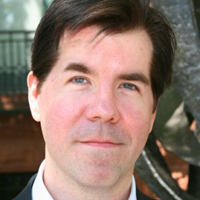Undoubtedly a team of scientists already has been dispatched to Las Vegas to study the phenomenon that tens of thousands of startled CNN viewers saw firsthand Tuesday night. For the first time in the five years since he launched his methodical, by-the-numbers, always placid, PowerPoint–inspired campaign for the presidency of the United States, an emoticon crossed Mitt Rombot’s faceplate. In layman’s terms, the former governor short-circuited. Even more surprising, the first person ever to dent that metallic exterior was the same one politicos had confidently written off only a few weeks ago.
Yes, Rick Perry—who in two months was transformed by the punditry from political sage to political sap—pulled off the feat that John McCain, Mike Huckabee, Rudy Giuliani, and Fred Thompson could never muster: getting under Romney’s skin. Despite glowing reviews, Perry’s was not an award-winning debate performance, to be sure; one hopes someone will tell him to quit calling Herman Cain “brother.” Yet his all-but-inevitable campaign comeback has commenced. One pundit went so far as to call the 2012 election “Perry’s to lose.”
That may be a stretch, but Tuesday’s televised encounter demonstrated that the Texas governor has the tools to put himself back at the forefront.
What follows are the top five ways his team still plans to make the 2012 Republican nominating contest a real race:
1.) Rake in the moolah. Lost in the headlines about Perry’s earlier debate performances, Gov. Chris Christie’s flirtation with a bid, and the Romney coronation by Republican elites is a simple, unalterable fact: in the most recent fundraising quarter, Perry outraised every candidate in the race—including the GOP’s frontrunner. A $17 million fundraising haul has a way of altering the dynamic of a race, and the Perry folks intend to use that money to do just that. The campaign ads are already being made (and if I were a member of the Romney family, I wouldn’t want to rush to a TV set).
2.) Force policy specifics. Perry’s advisers seek to take advantage of Romney’s image as a hypercautious technocrat and position Perry as the agent of bold ideas. The strategy is to force Romney to offer some policy specifics or risk the label of the substance-free, “cotton candy” candidate. Already the Texas governor has outlined a sweeping plan on energy, which has won praise from conservatives. In Tuesday’s debate he even mused about cutting off funding to the United Nations. Up next: proposals on the economy, including a national flat tax. Specifics on health care, immigration, and foreign policy seem certain to follow.

3.) Pitch Romney vs. Romney. Perry’s already done one Internet ad reminding voters that Romney was not always as conservative as he now contends. That is just the start. From tax relief to gay rights to health care, Romney has been all over the political map. He has confided to associates that he lives in fear of the flip-flopper tag, which is why he works so hard to try to pin it on his opponents. That isn’t going to stop the Perry forces, however. “We’re going to have [Romney] debating himself before it’s all over,” Perry’s chief adviser, Dave Carney, said after the debate on Tuesday night. Take Carney as a man of his word.
4.) Wait for the Cain folks. Deep in their hearts, few of Herman Cain’s supporters truly think he is ready to be president of the United States—including Cain himself. But it is no coincidence that Cain rose in the polls precisely when Perry began to disappoint his conservative backers. The former Godfather’s Pizza CEO inherited Perry voters disappointed with their man’s performance. For those voters, Cain serves as a holding platform until they find a viable Romney alternative. Perry’s debate performance on Tuesday night, coupled with his impressive money haul, will convince those voters once again that he is the best person for that job. The other night Perry took care not to criticize Cain too sharply; he knows those voters are going to come back to him.
5.) Make the mainstream media his friend. Perry has weathered the most withering media scrutiny since Montgomery Burns ran for governor on The Simpsons. Perry’s been called a dope, a racist, a liberal, and a wacko. His decades-old marriage has even come under relentless scrutiny and suspicion. The media loves to do this to a candidate. They looked at Perry, told him who was boss, knocked him down several pegs, and waited to see if he’d succumb. He hasn’t, at least not yet. Now Perry and reporters are in a different phase: codependency. Perry needs them for positive headlines about his comeback. And the media needs a formidable foe for Romney to keep the race interesting. The media flirted with Palin and Christie and Cain for that slot, but they soon will conclude that Perry is the only one who can foot that bill. From animosity to codependency in the space of a few weeks—that’s politics.






